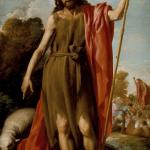
Far too many Protestants make such a big stinking deal about how Catholics like to have “certainty” and how silly and foolish — almost “infantile” — that supposedly is (as if it were some foreign concept in Scripture). It’s not at all! One anti-Catholic tonight even ridiculously compared this to being nearly mentally ill, or on the path to same, anyway. Catholics have only a deluded certainty and mental illness . . .
How dare we actually believe that God wants us to know truth! How naive! How silly! How childish! God can’t do that! He wouldn’t do it because He isn’t able to (is what this line of thinking amounts to: a sheer lack of faith in God).
I flip that canard around and talk about how many Protestants are on a “quest for uncertainty” that never ends. It’s a very common theme. They glory in it. They think it’s great (rather than a tragic scandal) that they can’t figure lots of things out in Christianity and that their sects endlessly contradict each other.
They are forever searching (i.e., those who think like this). I like the treasure hunt as much as the next guy (and I joyously found the pearl of great price in 1990), but God wants us to know the truth, so we can fully live by it, rather than spend our whole lives searching, as if faith and spirituality were mere philosophy or a sort of “whodunit” where the (lifelong?) search is for the fullness of Christian truth rather than the murderer.
Many Protestants don’t think that the fullness of Christian truth is possible to find at all. They go beyond the endless quest and questioning to a sort of apathy or “worldly wise” cynicism. They’ve long since given up and resigned themselves to Protestant institutional chaos, and play self-deluded games that there is such a thing as “secondary doctrines” where it’s fine to disagree and contradict each other, since God supposedly didn’t make it clear enough in Scripture (how ironic!).
There are only so many ways to rationalize a violently, utterly unbiblical denominationalism. You either keep searching forever among the infinite choices, or become apathetic that the fullness of Christian truth can be found amidst the chaos and anarchism (you can easily find belief in the Trinity, etc.). A false idea (rampant sectarianism) brings about a lot of additional bad fruit. This is one of ’em (among many I can think of).
Protestants have taken on this sort of agnostic / postmodernist way of thinking that was never intended by God to be the case for Christians. We were to know that we knew what the truth was, in faith, and follow God, not search endlessly for what is true in the first place, or always be uncertain of what we do follow.
Catholics have community, precisely because we are united around this set of truths called “Catholicism.” It’s not just arbitrary: “hey, look, a billion people all believe thus-and-so, so I’m gonna go join in and throw Frisbees and sing Kumbaya!” It’s based on the finding of a real truth that really is there: “true truth,” as Francis Schaeffer called it.
Thus, those of us who follow that ancient Christian tradition are classified as infantile nuts, because we are still so silly as to believe that we can know truth with certitude, in Christ, and in His Church. Many atheists consider all Christians to be infantile, gullible simpletons. Thus Protestants act like atheists in this respect, falsely accusing Catholics of belief in thing that they can’t bring themselves to accept.
And of course we can be comforted knowing that Jesus was accused of being demon-possessed, and of being a follower of Beelzebub (Mt 10:25; 12:24, 27; Mk 3:22; Lk 11:15, 18-19, etc.):
Luke 7:33 (RSV) For John the Baptist has come eating no bread and drinking no wine; and you say, `He has a demon.’
John 10:19-21 There was again a division among the Jews because of these words. [20] Many of them said, “He has a demon, and he is mad; why listen to him?” [21] Others said, “These are not the sayings of one who has a demon. Can a demon open the eyes of the blind?”
Anti-Catholic Protestant Ken Temple and more ecumenical Protestant C. Michael Patton both have made the same sort of argument: Ken citing Michael on James Swan’s Boors All blog:
This part of C. Michael Patton’s article was especially good in shooting down the typical Roman Catholic method of trying to sow doubt and confusion into the mind of sensitive Protestants who also enjoy church history, who take seriously the Biblical doctrine of the church; and who take historical theology seriously.
We have a term that we use for people who require infallible certainty about everything: “mentally ill.” Remember What About Bob? He was mentally ill because he made decisions based on the improbability factor. Because it was a possibility that something bad could happen to him if he stepped outside his house, he assumed it would happen. There are degrees of probability. We act according to degrees of probability. Simply because it is a possibility that the sun will not rise tomorrow does not mean that it is a probability that it won’t.
I am not saying that all Roman Catholics are mentally ill; but I am just agreeing that that kind of skepticism leads to such instability that it leads people astray from the truth, and it could possibly lead to mental illness.
The same argument can be made about uncertainty about the canon and interpretation of Scripture.
Just because there is a possibility that we are wrong (being fallible), does not mean that it is a probability. Therefore, we look to the evidence for the degree of probability concerning Scripture. The smoke screen of epistemological certainty that seems to be provided by having a living infallible authority (Magisterium) disappears when we realize that we all start with fallibility. No one would claim personal infallibility. Therefore it is possible for all of us to be wrong. We all have to start with personal fallible engagement in any issue. Therefore, any belief in an infallible living authority could be wrong.
We can also relish the fool’s humor of these clowns thinking that Catholics think they know everything with “infallible certainty.” On the one hand, we hear this garbage. Then the same people will turn around and make fun of the Church when she takes centuries to define a dogma at the highest levels precisely because we do recognize gradations of certainty and binding status. But don’t ever hold your breath expecting an anti-Catholic to provide an intelligent or consistent or truthful commentary on Catholicism.
It reminds me of a talk one Catholic apologist gave some years ago, where he noted about twenty different ways that critics of the Church will accuse Catholics of one thing while simultaneously accusing them of another that is completely contradictory to the first. It doesn’t matter! All that matters in that mentality is that Catholics are bashed. Whether it is true or factual or logical or consistent doesn’t matter a hill of beans.
One of the leading arguments of atheists is: “how can Christians have any credibility because they disagree with each other so much?” In this sense, the atheist often understands the utter scandal of division and disunity even more than many Protestants do, who rationalize it away and glory in it. Luther and Calvin are certainly turning over in their graves. Despite their many errors, they never believed ideas as silly as these. They believed that there was one fullness of Christian truth and that they had it in their own camp (precisely as Catholics continue to believe).
***
Related Reading:
Dialogue on the Logic of Catholic Infallible Authority [6-4-96]
Church Authority & Certainty (The “Infallibility Regress”) [July 2000; some revisions on 12-8-11]
Dialogue on the Protestant “Non-Quest” for Certainty [3-15-06]
Ecclesiological Certainty (?) & the “Infallibility Regress” [5-22-03 and 10-7-08]
Glorying in Uncertainty in Modern Protestantism (Dialogue with a Calvinist) [11-11-09]
Does Church Infallibility Require Infallible Catholics? [6-8-10]
***
(originally 2-12-14 on Facebook)
Photo credit: geralt (11-8-14): “Chaos” fractal [Pixabay / Pixabay License]
***













